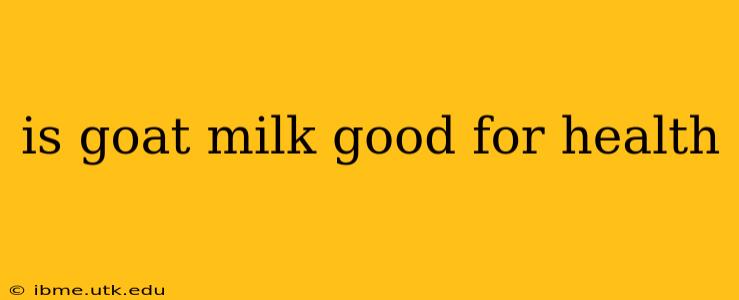Is Goat Milk Good for Health? A Comprehensive Look at the Benefits and Drawbacks
Goat milk has gained popularity as a dairy alternative, touted for its potential health benefits. But is it truly a superior choice compared to cow's milk? Let's delve into the nutritional profile and explore the claims surrounding its health impact. This article will address common questions and provide a balanced perspective on whether goat milk is good for your health.
What are the nutritional benefits of goat milk?
Goat milk boasts a similar nutritional profile to cow's milk, offering essential nutrients like protein, calcium, and vitamin B12. However, some key differences exist:
- Fat Content: Goat milk typically has a higher fat content than cow's milk, much of it in the form of medium-chain triglycerides (MCTs), which are easier for the body to digest. This can be beneficial for those with digestive sensitivities.
- Protein Structure: Goat milk proteins have a smaller size than those in cow's milk. This difference may contribute to easier digestion and potentially reduce allergic reactions, although further research is needed. Those with cow's milk allergies might find goat milk more tolerable, but it's crucial to consult with a doctor or allergist before making dietary changes.
- Minerals: Goat milk contains higher levels of certain minerals, such as potassium, compared to cow's milk.
- Vitamins: While similar in many vitamins, the vitamin content can vary depending on the goat's diet and breed.
Is goat milk easier to digest than cow's milk?
This is a common claim, and the evidence is mixed. The smaller protein molecules in goat milk might contribute to better digestibility for some individuals, particularly those sensitive to cow's milk proteins. However, individual responses vary greatly. Some people experience no difference in digestion, while others find it easier on their stomachs. If you have digestive issues, introducing goat milk slowly and monitoring your response is essential.
Does goat milk have fewer allergens than cow's milk?
While some individuals with cow's milk allergies find goat milk more tolerable, it's not allergen-free. Goat milk still contains proteins that can trigger allergic reactions, though the type of proteins differ. It's crucial to consult an allergist before substituting goat milk for cow's milk if you have a confirmed milk allergy. A small percentage of individuals allergic to cow's milk will also react to goat milk.
Is goat milk better for people with lactose intolerance?
Goat milk contains lactose, the sugar in milk that many lactose-intolerant individuals struggle to digest. While some find goat milk easier to digest due to the different protein structure, it doesn't guarantee lactose tolerance. The amount of lactose is roughly comparable to cow's milk. If you're lactose intolerant, you might still experience symptoms after consuming goat milk, and lactose-free options might be a better choice.
What are some potential drawbacks of drinking goat milk?
- Potential for higher saturated fat: The higher fat content in goat milk includes saturated fat, which can contribute to high cholesterol if consumed in excess. Moderation is key.
- Taste and Odor: Goat milk has a distinctly different taste and sometimes a stronger "goaty" odor that some people find unappealing.
- Availability: Goat milk may be less readily available than cow's milk in certain regions.
- Cost: Goat milk tends to be more expensive than cow's milk.
Conclusion:
Whether goat milk is "good" for your health depends on your individual needs and preferences. It offers a comparable nutritional profile to cow's milk with some potential advantages regarding digestibility for certain individuals, but it's not a miracle cure or universally superior option. If you're considering switching to goat milk, consult your doctor or a registered dietitian, especially if you have any pre-existing health conditions or allergies. Listen to your body, start with small amounts, and observe how it affects your digestion and overall well-being.
